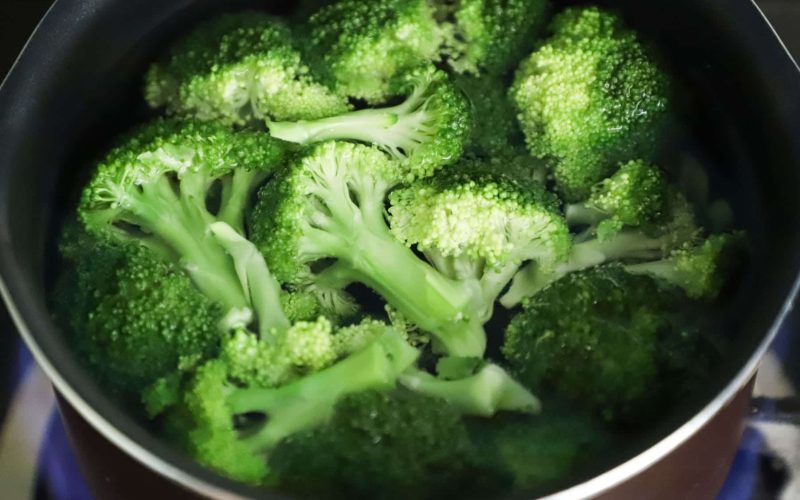Broccoli is a cruciferous vegetable that vaguely resembles a tree. It belongs to the plant species Brassicaceae Oleracea alongside kale, cauliflower, cabbage, Brussels sprouts, collard greens, turnips, and bok choy.
There are many varieties of broccoli that are popular in different regions where they grow. However, there are three well-known varieties in most parts of the world, namely:
- Calabrese broccoli: this is the most variety of broccoli, named after Calabria (Italy) and is simply known as broccoli.
- Sprouting broccoli: this type has thin stalks and many heads
- Purple cauliflower: it is a variety of broccoli that is shaped like a cauliflower (hence the name), and it consists of tiny flower buds.
Other varieties include broccoflower, Chinese broccoli and broccoli rabe.
This nutritional powerhouse contains a wealth of vitamins, antioxidants, fibres and minerals that supports many areas of human health.
Nutritional Information
| Broccoli, raw | |
| serving size: 1 cup chopped (91g) | |
| Water [g] | 81.26 |
| Energy [kcal] | 30.94 |
| Protein [g] | 2.57 |
| total lipids [g] | 0.34 |
| carbohydrate, by difference [g] | 6.04 |
| fiber, total dietary [g] | 2.37 |
| sugars, total [g] | 1.55 |
| calcium, Ca [mg] | 42.77 |
| iron, Fe [mg] | 0.66 |
| magnesium, Mg [mg] | 19.11 |
| phosphorus, P [mg] | 60.06 |
| potassium, K [mg] | 287.56 |
| sodium, Na [mg] | 30.03 |
| zinc, Zn [mg] | 0.37 |
| vitamin C, total ascorbic acid [mg] | 81.17 |
| thiamin [mg] | 0.06 |
| riboflavin [mg] | 0.11 |
| niacin [mg] | 0.58 |
| vitamin B-6 [mg] | 0.16 |
| folate, DFE [µg] | 57.33 |
| vitamin B-12 [µg] | 0.00 |
| vitamin A, RAE [µg] | 28.21 |
| vitamin A, IU [IU] | 566.93 |
| vitamin E (alpha-tocopherol) [mg] | 0.71 |
| vitamin D (D2+D3) [µg] | 0.00 |
| vitamin D [IU] | 0.00 |
| vitamin K (phylloquinone) [µg] | 92.46 |
| fatty acids, total saturated [g] | 0.10 |
| fatty acids, total monounsaturated [g] | 0.03 |
| fatty acids, total polyunsaturated [g] | 0.10 |
| fatty acids, total trans [g] | 0.00 |
| cholesterol [mg] | 0.00 |
| caffeine [mg] | 0.00 |
Health benefits
The health benefits of this superfood include the following
Enhance brain function
Broccoli is packed with nutrients and bioactive compounds that may reduce mental decline and aid healthy nervous tissue and brain function.
A study in 960 older adults showed that consuming a serving of dark green veggies, like broccoli, daily may help fight mental decline associated with ageing.
Furthermore, broccoli contains kaempferol – a bioactive compound – that helps protect against brain injury and neuroinflammation.
Results from an animal study showed that kaempferol could help reduce inflammation of the neural tissue and lower incidence of brain injury in rats following a stroke-like event.
Additionally, broccoli contains a useful bioactive compound called sulforaphane. It has the potential of supporting brain function after a case of reduced oxygenation to the brain.
Some animal studies reveal that sulforaphane is effective in lowering neural inflammation and significantly regenerating brain tissue in rats suffering from brain injury or toxic exposure.
However, current researches that assess the potency of bioactive compounds in broccoli on neurological functions are strictly based on animal studies. Therefore, more studies are required to determine how these compounds affect brain health in humans.
May help combat the ageing process
The ageing process is primarily attributed to reduced metabolic function and oxidative stress over the course of our lifespan.
Although ageing is an inevitable life process, a recent study indicated that diet quality might be crucial in determining the expressions of genes and the development of age-related conditions.
Research indicates that the presence of sulforaphane in broccoli may possess the ability to stimulate the expressions of metabolic genes, thereby slowing the biochemical process of ageing.
However, more human research is needed to better understand the relationship between the dietary consumption of broccoli and its effect on the ageing process.
May improve oral and dental health
Broccoli is packed with a wide range of nutrients, some of which are known for preventing dental diseases and supporting oral health.
Calcium and vitamin C are two nutrients found in broccoli that has been linked with reduced risk of gum disease (periodontitis). Furthermore, the presence of the flavonoid, kaempferol in broccoli may also play a pivotal role in preventing periodontitis.
Additional studies indicate that the presence of sulforaphane in broccoli may reduce the risk of oral cancers.
Some sources also claim that broccoli can help remove plaque and whiten teeth manually when eaten raw. However, there is no existing scientific evidence to back this claim.
Still, more human research is required to understand how broccoli and its bioactive components can help to support oral health.
May support healthy bone and joints
Broccoli is a good source of countless nutrients that are known to maintain healthy bones and prevent bone-related diseases.
Some of these nutrients in broccoli that have proven vital in supporting strong and healthy bones include vitamin K and calcium.
It also packs fair amounts of vitamins A and C, phosphorus and zinc, which are also necessary for healthy bones.
Boost healthy immune function
This cruciferous vegetable contains an array of nutrients that tend to support a healthy immune response.
One of which is the presence of vitamin C, which is arguably the most essential nutrient for immune function.
Studies indicate that vitamin C plays a pivotal role in the prevention and treatment of some illnesses. Taking 100 to 200mg of this antioxidant daily may help prevent certain infections.
Also, taking vitamin C supplements may help reduce the symptoms and shorten the length of several illnesses, including common cold.
Prevents cardiovascular diseases
The high fibre content of broccoli along with the antioxidant glucoraphanin helps reduce bad cholesterol level or LDL and maintains healthy heart function.
One study demonstrated that broccoli sprout supplements could reduce LDL or bad cholesterol and triglyceride levels as well as increase HDL or good cholesterol levels in type-2 diabetes patients.
A 2017 review showed that people who consume the most fibre-rich foods like broccoli have lower levels of blood lipids and are less prone to cardiovascular diseases than people who eat less.
Aid fetal development during pregnancy
Your body requires a variety of minerals, proteins and vitamins during pregnancy to support both mother and baby.
Broccoli contains vitamin B9 or folate, which is an essential nutrient for the development of the fetal spinal cord and brain. Regular intake of folate-rich foods like broccoli can help protect against defects in the development of the fetus.
It is also a rich source of fibre which helps eliminate constipation in pregnant women.
Anti-cancer properties
Certain bioactive compounds found in cruciferous vegetables, such as broccoli, may help decrease cell damage caused by certain chronic diseases.
Several small studies have pointed out that consuming cruciferous vegetables may reduce the risk of certain cancers, namely;
- Bladder
- Breast
- Colorectal
- Gastric/stomach
- Renal/kidney
- Prostate
However, this data – though encouraging – lacks serious backings to support a definitive health claim as regards to broccoli’s role in cancer prevention and treatment.
Ultimately, more human study is required to understand how cruciferous vegetables can impact cancer prevention.
Potent antioxidant properties
Free radicals or recessive protein species are molecules that the body produces during metabolism or environmental stress.
In large quantities, molecules are toxic to the body and can damage cells leading to cancer and other conditions.
The body is capable of eliminating them most times, but dietary antioxidants can also help.
Being a superfood, broccoli contains potent antioxidants that can inhibit or reverse the damage caused by free radicals, leading to reduced inflammation and overall health protection.
Broccoli has in high quantity; a compound called glucoraphanin. It is a key ingredient in the production of a potent antioxidant called sulforaphane during digestion.
Animal and test-tube studies suggest that sulforaphane may offer several health benefits including, reduced cholesterol levels, blood sugar levels, development of chronic diseases and oxidative stress.
However, more research is required to understand its role in human health.
Broccoli also contains measurable amounts of antioxidants lutein and zeaxanthin, which may prevent oxidative stress and promote ocular health.
Improves skin health
Vitamin C is a key ingredient in the production of collagen in the body, which is the primary support system for cells and organs. It’s also an antioxidant that helps protect against skin damage.
Along with vitamin C, antioxidants like beta-carotene amino acids, folate vitamin A, vitamin E, vitamin K and vitamin B complex present in broccoli helps in maintaining glowing, healthy and radiant skin.
How can I store broccoli?
You can store broccoli by misting its unwashed head and wrapping it in paper towels. It can stay in the refrigerator for 2 – 3 days tops. However, it’s advised that you use fresh vegetables in your cooking
Does broccoli have any side effects?
Although broccoli is associated with countless health benefits, taking large amounts of the vegetables might have some side effects. The common side effects include
- Gas
- Abdominal pain
- Skin rashes
- Bloating
- Allergic reaction
Risks
Hypothyroidism: if you have an iodine deficiency, taking this vegetable in excess could interfere with the production of thyroid hormone in the body. This is as a result of the vegetable’s high-fibre content.
Blood-thinning: broccoli also contains vitamin K, which can inhibit your anticoagulant medication. So avoid adding it to your diet if you’re already on warfarin or any other blood-thinning medication.
To be safe, it’s best to speak with your doctor before incorporating it into your diet in large amounts. Other than that, eat it in moderation and start ripping the health benefits right away.
Bottom line
Broccoli is a nutrient powerhouse that may enhance your health in diverse ways, including boosting heart health, reducing inflammation, and boosting immunity.
However, it is worthy to note that good health doesn’t come from only one food source. This cruciferous vegetable is merely one of the many healthy foods that can contribute to optimal health.
Adding this superfood to your healthy, balanced diet may help you crush your health goals more easily.
References
- Nutrients and Bioactives in Green Leafy Vegetables and Cognitive Decline. NCBI
- Neuroprotective Effect of Kaempferol Glycosides Against Brain Injury and Neuroinflammation. NCBI
- Effects of Sulforaphane and Vitamin E on Cognitive Disorder and Oxidative Damage in Lead. NCBI
- Sulforaphane Activates the Cerebral Vascular Nrf2-ARE Pathway and Suppresses Inflammation to Attenuate Cerebral Vasospasm in Rat With Subarachnoid Hemorrhage. NCBI
- Epigenetic linkage of ageing, cancer and nutrition. NCBI
- Oxidative Stress, Mitochondrial Dysfunction and the Mitochondria Theory of Aging. Karger
- Prevention of Carcinogen-Induced Oral Cancer by Sulforaphane. NCBI
- Identification of Hop Polyphenolic Components Which Inhibit Prostaglandin E2 Production by Gingival Epithelial Cells Stimulated With Periodontal Pathogen. NCBI
- Nutrition and health: guidelines for dental practitioners. Wiley Online library
- Vitamin C and Immune Function. NCBI
- Sulforaphane Protects Human Chondrocytes Against Cell Death Induced by Various Stimuli. NCBI
- Vitamin K‑dependent Proteins Involved in Bone and Cardiovascular Health (Review). NCBI
- Consumption of Broccoli Sprouts During Late Gestation and Lactation Confers Protection Against Developmental Delay Induced by Maternal Inflammation. NCBI
- Broccoli Sprout Supplementation During Pregnancy Prevents Brain Injury in the Newborn Rat Following Placental Insufficiency. NCBI
- High-pressure treatments induce folate polyglutamate profile changes in intact broccoli (Brassica oleraceae L. cv. Italica) tissue. Science Direct
- Dietary antioxidants and human immune function. Wiley Online library
- Look to Fruits and Vegetables for Good Eye Health. NY State Health
- Antioxidant and Anti-inflammatory Activities of Broccoli Florets in LPS-stimulated RAW 264.7 Cells. NCBI
- Diet and hair loss: effects of nutrient deficiency and supplement use. NCBI





